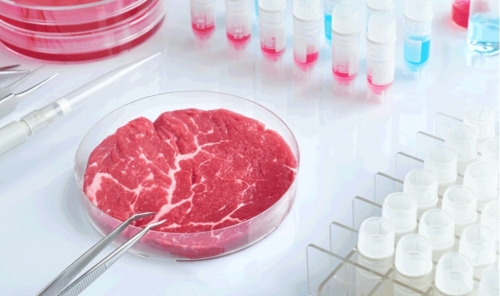Lab-Grown Meat, Dairy, and Sugar Could Hit UK Markets Within Two Years
TDT | Manama
Email : editor@newsofbahrain.com
Lab-grown meat, dairy, and sugar could be available for human consumption in the UK within the next two years, as regulators seek to fast-track the approval process. The Food Standards Agency (FSA) is exploring ways to expedite the authorization of lab-grown food products, which are cultivated from cells in controlled chemical environments.
While UK firms have been at the forefront of this scientific advancement, many feel that current regulations have hindered their progress. The move to accelerate approvals aims to address concerns that British companies are falling behind international competitors, where regulatory processes are significantly quicker.
Last month, the UK saw its first commercial sale of pet food containing lab-grown meat, a development that has sparked increased discussion on the potential for similar products to reach human consumers. Globally, Singapore became the first country to approve the sale of cultivated meat in 2020, followed by the United States in 2023 and Israel in 2024. However, not all regions are embracing the technology—Italy, along with the US states of Alabama and Florida, have imposed bans on lab-grown food.
In response, the FSA is collaborating with experts from high-tech food companies and academic institutions to develop new regulations. The agency aims to complete the full safety assessment of at least two lab-grown food products as part of a two-year approval framework.
However, critics argue that involving food companies in drafting the new regulations presents a conflict of interest. Pat Thomas, director of the campaign group Beyond GM, expressed concerns about industry influence, stating, "The companies involved in helping the FSA to draw up these regulations are the ones most likely to benefit from deregulation. If this were any other type of food product, we would be outraged by it."
Defending the approach, FSA chief scientist Prof. Robin May emphasized that consumer safety would not be compromised. "We are working very closely with the companies involved and academic groups to design a regulatory structure that benefits innovation while ensuring food safety remains at the highest possible level," he told BBC News.
Science Minister Lord Vallance dismissed concerns about deregulation, framing the changes as "pro-innovation regulation." He explained, "We are trying to align regulations with the needs of innovation and reduce unnecessary bureaucracy and duplication."
Lab-grown foods are developed by growing plant or animal tissue from small cell samples. In some cases, gene editing is used to enhance specific properties of the food. Proponents claim that these products could be more environmentally sustainable and healthier alternatives to traditionally farmed foods.
The UK government is keen to see lab-grown food firms flourish, hoping they will drive job creation and economic growth. Despite the country's strong scientific expertise in this field, regulatory delays have slowed commercial progress compared to other nations such as Singapore, the US, and Israel.
One company eager for change is Ivy Farm Technologies, based in Oxford. The company has already developed lab-grown steaks using cells from Wagyu and Aberdeen Angus cows. Ivy Farm applied for regulatory approval to sell its steaks to restaurants early last year, but CEO Dr. Harsh Amin believes the two-year waiting period is a major obstacle.
"If we can shorten that to less than a year while maintaining the very highest of Britain's food safety standards, that would help start-up companies like ours to thrive," Amin stated.
With the FSA's new initiative underway, the UK may soon join the growing list of nations where cultivated food products are available to consumers, signaling a potential shift in the future of food production.
Related Posts

